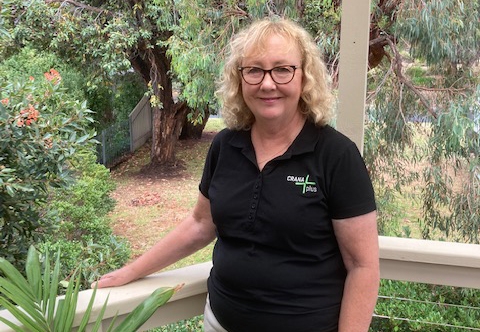This site may not work properly using older versions of Edge and Internet Explorer. You should upgrade your browser to the latest Chrome, Firefox, Edge, Safari, or any other modern browser of your choice. Click here for more information.
Your Stories
This is where we tell your stories, cover topical issues and promote meaningful initiatives.
End of an Era: Farewell to Long-time Facilitator, Rosemary Moyle
A facilitator on the CRANAplus REC Course since the very beginning, Rosemary Moyle continued to bring her wide-ranging experience to CRANAplus courses until 2021. As she hangs up the boots, Rosemary reflects on her favourite memories and how the REC course has evolved over time.

In 1997, CRANAplus received funding from the Australian Department of Health to develop and implement a pilot program of remote emergency care courses.
Rosemary Moyle’s manager at Royal Flying Doctor Service (RFDS), Geri Malone, told her about the opportunity. She decided she’d “give it a go” and became one of the first facilitators to ever deliver a REC course.
In 2021, Rosemary delivered her final course for CRANAplus, an Advanced Life Support course in Adelaide which marked her 41st course since 2013, when the current method of record keeping was introduced.
Her longstanding involvement saw her deliver education in all Australian states and territories, and as far afield as Christmas Island.
What inspired Rosemary to facilitate for 24 years?
“I love being in clinics, hearing the stories,” Rosemary says. “Meeting, face to face, people who I might have talked to on the phone before, or who were there when I went to pick up a patient [with the RFDS]. We could talk about that and how that turned out.
“I love the little outback communities and the people that work there. I remember we delivered a course up in north-western Australia once, and the people who were attending hadn’t been to such a course before.
“We started talking about the ABCs – airways, breathing, circulation – and someone came up to me later and he said, ‘you know, I’ve never heard of this ABC stuff before, but I’m going to remember that. That’s good, I can remember ABC.’ That sticks in my mind.
“I love the hospitality and the appreciation of the people in the bush,” Rosemary continues.
“I know myself having lived in the country how difficult it is to get to the city sometimes. You’ve got to get a course, accommodation, time off work, time away from home. To be able to do it locally is so much better.
“We did a course in outback Queensland and one of the students was a lady who worked on a cattle station. She drove the truck in to do the course – a semi-trailer – because that was her mode of transport. I was in awe that she could drive down the main street and turn up that way.
“Also, I always learn something from the courses – something local, like a local treatment for, say, jellyfish stings,” she adds.
“There are other places we’ve been where they’ve just had a bushfire or flood. Talking with the local staff about how they’ve dealt with that was quite a learning experience for me.”
How has remote health changed over time?
“Education is more available nowadays,” Rosemary says. “Staff are much more willing to partake in educational opportunities – they grasp them wherever they can.
“There are some very professional nurses out there that are very experienced, and they enjoy their jobs. They have to be quite resilient people with lots of other skills apart from working in clinical health care, such as driving a 4WD or changing a tyre. They might have to report on the weather or be the post office for that particular place.
“Some places are very well equipped, and others hardly have anything at all to work with. However, I think that has changed quite a bit.
[In the present day] it’s much more standardised across the health services, which makes it easier for people to use equipment.
“[Remote health] still has its challenges,” Rosemary reflects. “There are still staff shortages, there’s still burn-out, there’s still a lot of things that come up to make people less resilient, I suppose – but they’re the salt of the earth Australians, I think, out there working.”
How have REC courses changed since the 1990s?
“Courses were organised differently [back then],” Rosemary says, with a laugh. “We used to have the old pen and paper, and printed notes and lectures, and a class-room type situation.
“There’s a bigger group of facilitators now, many from varying backgrounds. At the beginning, we had to write our own lectures, and what you brought to them depended on what sort of background you had. Now, they are standardised and formal, so it stops that variance in knowledge.
“Over time the emphasis has become less on lectures and more on practice… We try to make it as much fun as possible. I think people enjoy less emphasis of sitting in a classroom; they enjoy the hands-on, and the ability to chat to each other in small groups.
“CRANA has grown,” Rosemary says in conclusion. “It’s offering more than it ever did in the past, and it is adjusting to the needs of the climate of health. Whether it be COVID, or working safely in a community, CRANA ventures across all of that.”
The CRANAplus Education Team extends a heartfelt thank you to Rosemary Moyle for her longstanding commitment and valued contributions as a Facilitator.
Find out more about the current CRANAplus Remote Emergency Care Course.